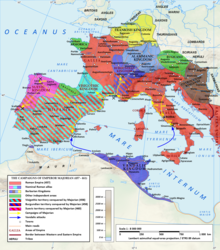This article needs additional citations for verification. (April 2019) |
| Millennium: | 1st millennium |
|---|---|
| Centuries: | |
| Decades: | |
| Years: |
| 458 by topic |
|---|
| Leaders |
| Categories |
| Gregorian calendar | 458 CDLVIII |
| Ab urbe condita | 1211 |
| Assyrian calendar | 5208 |
| Balinese saka calendar | 379–380 |
| Bengali calendar | −135 |
| Berber calendar | 1408 |
| Buddhist calendar | 1002 |
| Burmese calendar | −180 |
| Byzantine calendar | 5966–5967 |
| Chinese calendar | 丁酉年 (Fire Rooster) 3155 or 2948 — to — 戊戌年 (Earth Dog) 3156 or 2949 |
| Coptic calendar | 174–175 |
| Discordian calendar | 1624 |
| Ethiopian calendar | 450–451 |
| Hebrew calendar | 4218–4219 |
| Hindu calendars | |
| - Vikram Samvat | 514–515 |
| - Shaka Samvat | 379–380 |
| - Kali Yuga | 3558–3559 |
| Holocene calendar | 10458 |
| Iranian calendar | 164 BP – 163 BP |
| Islamic calendar | 169 BH – 168 BH |
| Javanese calendar | 343–344 |
| Julian calendar | 458 CDLVIII |
| Korean calendar | 2791 |
| Minguo calendar | 1454 before ROC 民前1454年 |
| Nanakshahi calendar | −1010 |
| Seleucid era | 769/770 AG |
| Thai solar calendar | 1000–1001 |
| Tibetan calendar | 阴火鸡年 (female Fire-Rooster) 584 or 203 or −569 — to — 阳土狗年 (male Earth-Dog) 585 or 204 or −568 |

Year 458 (CDLVIII) was a common year starting on Wednesday (link will display the full calendar) of the Julian calendar. At the time, it was known as the Year of the Consulship of Maiorianus and Leo (or, less frequently, year 1211 Ab urbe condita). The denomination 458 for this year has been used since the early medieval period, when the Anno Domini calendar era became the prevalent method in Europe for naming years.